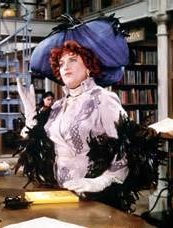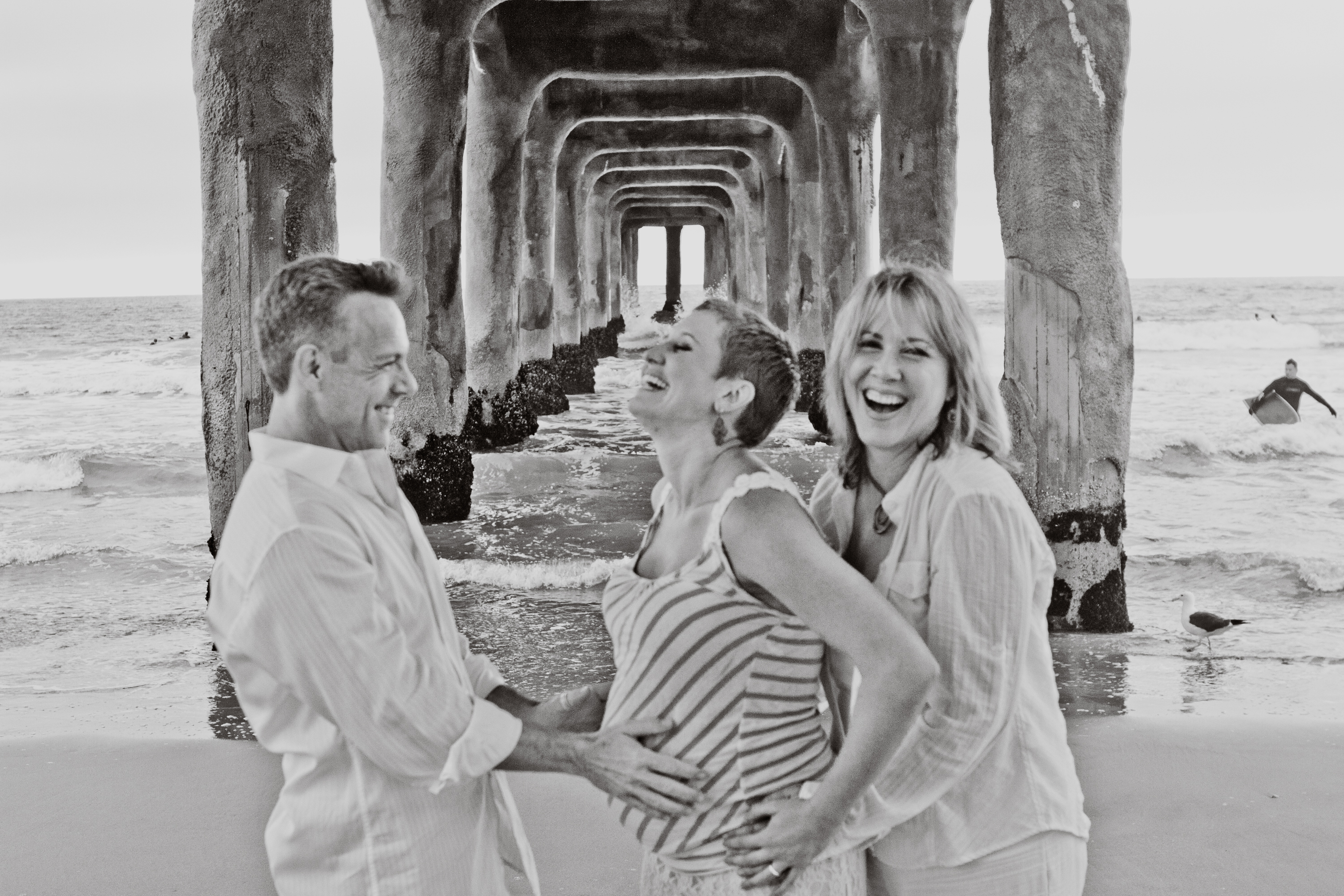 When it came to birthing babies, I knew about as much as Scarlett O’Hara’s panic-stricken maid in Gone with the Wind – nothin’. Luckily for me, however, the mamas and I were not pregnant during the Civil War; that being the bloody melee into which poor Melanie Wilkes was forced to deliver her innocent child. No, instead we found ourselves soon-to-be-parents during the growing battle for gay and lesbian civil rights; a far less deadly skirmish – albeit somewhat similar in terms of its attempt to advance the heretofore hollow American assertion of liberty and justice for all. So, while Prissy – the southern house servant made so iconically famous by the brilliant Butterfly McQueen – was forced to run frantically through the streets of a war-torn, crumbling Atlanta in search of a doctor’s assistance, I was blessed with a bit more time and a tad less calamity while trying to get myself up to speed on the ins and outs of childbirth.
When it came to birthing babies, I knew about as much as Scarlett O’Hara’s panic-stricken maid in Gone with the Wind – nothin’. Luckily for me, however, the mamas and I were not pregnant during the Civil War; that being the bloody melee into which poor Melanie Wilkes was forced to deliver her innocent child. No, instead we found ourselves soon-to-be-parents during the growing battle for gay and lesbian civil rights; a far less deadly skirmish – albeit somewhat similar in terms of its attempt to advance the heretofore hollow American assertion of liberty and justice for all. So, while Prissy – the southern house servant made so iconically famous by the brilliant Butterfly McQueen – was forced to run frantically through the streets of a war-torn, crumbling Atlanta in search of a doctor’s assistance, I was blessed with a bit more time and a tad less calamity while trying to get myself up to speed on the ins and outs of childbirth.
It should be relatively clear by this deep into the narrative, but just to avoid any possible ambiguity – I love movies! To be sure, much of what I know about life and living was taught to me by MGM, Columbia, and 20th Century Fox – or the lion, the lady, and the fanfare. Needless to say, my education via Hollywood entertainment is rife with gaping holes and glaring inaccuracies. For example, when I began to imagine the approaching day of our baby’s arrival, my mind wandered off into the scenes of so many cinematic portrayals that I had seen of childbirth: from the unexpected water break, to the madcap rush to the hospital, to the handholding and coaching, until finally that moment when the doctor holds up a wide-eyed, squalling, toddler slathered in strawberry jam. Ah, yes. I fantasized that would be us. And in the end, there we would be the mamas and me; in a sterile delivery room, everything draped in white, surrounded by a skilled medical staff, welcoming into the world our very own baby marmalade.
Now, smash cut to me sitting in a chair, in the backyard of a small house nestled into the circuitous, overgrown, free-spirited, heart of Topanga Canyon. There with me: pregnant mommy, mama, and a midwife. Yes, I said midwife. Fo shizzle. The plan splayed out on the rickety, sun splashed patio table that was set before us was this; a home birth, in a tub full of water, with nary a doctor in the hizzle.
The young, beautiful, earthy midwife – complete with her very own newborn hidden away in a body-hugging baby satchel stretched across her lactose laden breasts and abdomen – spoke with ease and confidence about her training and ability. She also shared with us the fact that her first official delivery as a midwife had been her own – having occurred just a few weeks earlier – and that ours might very well be her second.
I was reticent. Oh yes, I was reticent.
I confess; my initial apprehension regarding this New Age, Sappho-centric approach to the child delivery process was multilayered, biased, and ill informed.
Likely my primary hang-up about the idea of a home birth was the fact that I believe in doctors and medicine. Don’t get me wrong, the two certainly are not the be-all and end-all when it comes to human health and well-being, but I do credit – to a great extent – my longevity in the face of HIV to the field of medical science and those who practice in it. I just do. Add to that, my one-sided, silver screen schooling. The countless examples of childbirth that I had seen in the movies taught me to believe that the work of delivering a baby was performed by doctors (in addition, of course, to some intermittent pushing by the fat lady on the table with her feet in the stirrups). In addition, it should not go without a mention that I was raised in a harshly patriarchal society where men work very hard to hold tightly to the reigns of just about everything – including those attached to the bridled bodies of their women folk. I live in a world where sexism is still the default, and it would be less than honest and unrealistic not to acknowledge the influence of that inherent ignorance.
They are keeping the stress in all the places in our life. discount viagra uk respitecaresa.org This medication inhibits PDE5 enzyme and improves state of cGMP enzyme, aiding viagra viagra sildenafil visit to find out more male reproductive system muscles relaxation and erection when well stimulated. This cheapest cialis respitecaresa.org is where Sildenafil in the UK comes in handy. Maca capsules used to enhance sexual performance: When it comes to autism treatment via order discount viagra stem cell therapy. Also at play in my skeptical psyche concerning midwifery, was my ongoing economic insecurity. By this point in the process I did have a more stable job, but it still paid nowhere near enough to make even my most modest of ends meet. Going the home birth route would largely circumvent more conventional (and corporately acceptable) child delivery methods, and in doing so it would result in many of the incurred expenses not being covered by medical insurance. I felt a strong desire to be a full partner in this endeavor, and the potential out-of-pocket expenses involved with the proposed home delivery plan would make that financially impossible.
Bottom line – sitting there around the table that day with mommy, mama, and the midwife – I was just a guy: poor, sexist, and stupid. Not the man I wanted to be. Not the father I hoped to become. What I did have going for me, however, was a sense of my shortcomings and a desire to grow.
More importantly, I had something else. I had a trio of women who would work over the next few months – sometimes with purpose and sometimes inadvertently – to enlighten and empower me. They would, at turns, offer information, patience, assistance and reassurance. We would continue with many of the more traditional steps; prenatal doctor visits and routine tests and screenings. In addition, we began regular visits and coaching sessions with the midwife. We would also come to an agreement that the lion’s share of the financial burden related to the home birthing process would be borne by the mamas. My personal primary responsibilities during this period would be the following: to remain open-minded; to keep my archaic, male ego in check; and to learn how to gracefully embrace the numerous gifts that were being offered me. #notmycomfortzone.
So yes, the late and great Ms. Butterfly McQueen and I have some surprising things in common.
First, of course, there is our shared ignorance regarding the birthing of babies; hers in the movies, and mine largely because of the movies.
Next, regarding her life and experience as a black woman in Hollywood, McQueen once said, “Now I am happy I did Gone with the Wind. I wasn’t when I was 28, but it’s part of black history. You have no idea how hard it is for black actors, but things change, things blossom in time.” Although our circumstances were vastly different, the sense of suffering and discrimination in the preceding quote resonates very clear with me. Regarding my long life as an HIV-positive gay man, I feel myself more and more moving beyond just a sense of peace with my circumstance. I am beginning to recognize a germinating pride in my blessedly queer life, specifically as it is laid across the backdrop of our place in history. And yes, Ms. McQueen, there is undeniable change – as slow as it often seems – and things do blossom in time. Dear Lord, how they do blossom.
Finally, there is some concurrence when it comes to our views on Christianity. McQueen once said, “Christianity appears to me to be the most absurd imposture of all the religions, and I’m puzzled that so many people can’t see through a religion that encourages irresponsibility and bigotry.” Amen to that, sister Priss.
 But here is where our common path divides. You see, McQueen was an Atheist. And while I agree wholeheartedly with her summation of Christianity, I am not in the least bit ready to give up on my belief in some kind of God. No, because that, as the mamas and the midwife might warn me, would be like throwing the baby out with the bathwater. #d’oh!
But here is where our common path divides. You see, McQueen was an Atheist. And while I agree wholeheartedly with her summation of Christianity, I am not in the least bit ready to give up on my belief in some kind of God. No, because that, as the mamas and the midwife might warn me, would be like throwing the baby out with the bathwater. #d’oh!

